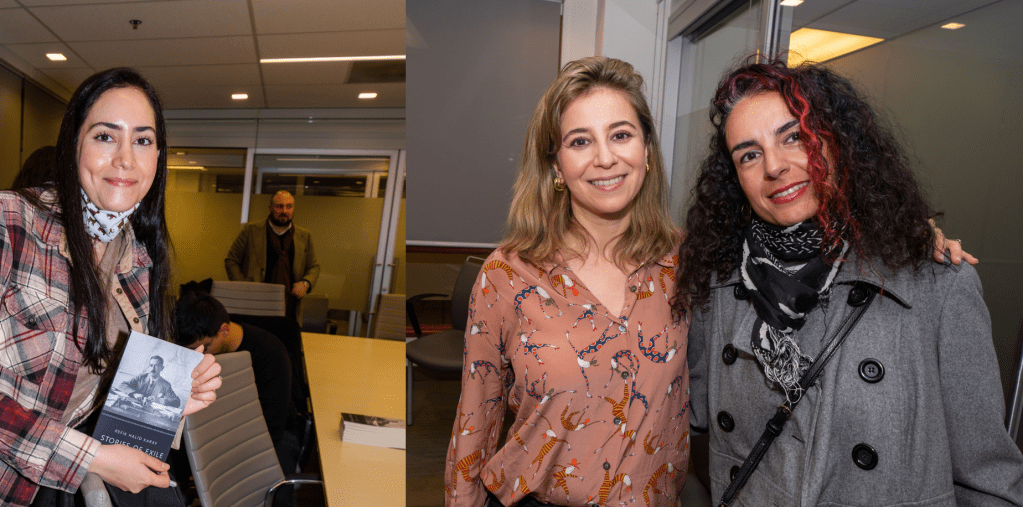By Karolina Dejnicka

Last week we launched our collective’s first published translation, Refik Halid Karay’s Stories of Exile, and the event was a huge success! Since this was our first launch, we didn’t know what to expect at all. Would people really show up? What if someone asks a question we didn’t know the answer to? What if no one asks any questions at all?
As it turned out, we didn’t need to worry about any of this – not only was there a full house in the seminar room, with many others joining us via Zoom, but the questions didn’t stop coming for the full two hours! We couldn’t have anticipated such a show of enthusiasm, and it was made all the more meaningful by the fact that the event was hosted by the University of Toronto’s Department of Near & Middle Eastern Civilizations, which is where our collective first began meeting as a student group in 2015. A special thank you to everyone involved with the Turkish Studies program at the NMC department for all their help and support with the event!
But there was one topic in particular that stood out when the time came for questions, and although we did expect it and addressed it a bit at the beginning of the discussion, it kept coming back up in different forms before, during, and after the launch:
“Why did you translate gurbet as exile?”
This was something our collective discussed at length in our workshops. What do you do when there is no translation equivalent?
The short answer:
Because “Stories of Exile” is shorter than “Stories of being away from home and of the feeling you get when you’re away from home that includes but isn’t limited to homesickness”
The long answer:
Gurbet is a tricky word without a perfect English translation. It is of Arabic origin, and indicates both a state of being and a state of mind. Someone who lives in gurbet is living away from home, either voluntarily (e.g. moving to another city or country for work) or involuntarily (e.g. being exiled from one’s homeland). However, the term also encompasses all the feelings that being away from home evokes – the discomfort, the melancholy, the strangeness of everything around you. This short word really speaks volumes!
Because “exile” doesn’t carry those emotional connotations, it’s not an exact equivalent. Exile could be translated into Turkish as sürgün, but this word places emphasis on the “banishment” aspect of exile, whereas exile in English can be either voluntary or involuntary – unless we’re talking about the verb specifically, i.e. to exile someone, which only means to send them into involuntary exile. When it comes to the noun, though, a person can either choose to live in exile, or be forced into it.
An alternative approach could have been to focus on the state of mind aspect of gurbet instead – the longing, the nostalgia. We considered this as well, especially given Karay’s undeniable nostalgia for the days of the Ottoman Empire as the reigning power in the Middle East, but didn’t find it to be as unifying a theme for what the characters were going through in the stories. While several protagonists did think wistfully about where they came from and what they had experienced in the past, several others were recounting horrific events. It was the state of being, not how they felt about their past, that they had in common.
Refik Halid Karay lived quite an eventful life, and his criticism found himself at odds with the ruling government of both the late Ottoman and early Republican Turkish governments. He was exiled twice for the stances he took against the ruling regime of the day. The first time, he had to leave his beloved Istanbul in 1913 for other parts of Anatolia, where he wrote the stories that would make up his first short story collection, Memleket Hikayeleri (“Stories of the Homeland”), published in 1919.
The second time, he fled to Syria and Lebanon in 1923 before being declared a persona non grata the following year, which effectively turned that voluntary exile into an involuntary one. This was where he wrote most of the stories that make up the Gurbet Hikayeleri collection, which he published in 1940, two years after his return to Turkey. This is the collection that we have translated and published as Stories of Exile.
The fact that Karay wrote a series of stories where the main characters were all away from home – whether they were stuck in a foreign setting, or just travelling there temporarily – while he himself was in exile was not lost on us. Almost all the stories in this second collection took place somewhere in the former Ottoman Empire – mostly in the Middle East, mirroring his own travels.
Nor could we ignore the fact that Karay’s first collection, which he wrote during his first exile, was titled Stories of the Homeland. Just as the Stories of Exile collection took place outside modern-day Turkey, mirroring his own travels, so too were the stories of his first collection inspired by his experiences as he spent that first exile in Sinop and other Anatolian towns. Karay had indeed been exiled from Istanbul, but he was still in Anatolia, which would make up the bulk of the Republic of Turkey a few years later.
This made “exile” even more appealing as an option. This was a book of stories about people living permanently in exile or travelling far from home, written by an author while he himself was in exile, that served almost as a companion piece to a previous series of stories about the Anatolian homeland – even though this homeland was culturally and geographically far from Karay’s home of Istanbul at the time.
So we finally settled on “exile” – the state of physically being in gurbet, whether voluntary or involuntary – even though it was missing the sentimental aspects that gurbet evokes.
We also considered “Stories from Exile” (and variations like “Stories from Abroad”, though we felt that one was too neutral) but felt that structuring it like this would’ve emphasized Karay’s location at the time of writing at the expense of the fact that being away from home is a central theme in all the stories.
Of course, not everyone will agree with our choices, but that’s fine, too – just look at how many English translations there are of Homer’s Iliad – 14 translations so far in the 21st century alone! We tell people all the time that if you want to translate something, don’t be deterred by the fact that a translation already exists – unless you really like it and see no room for improvement. I, for one, am enamoured with Maureen Freely’s translation of Kürk Mantolu Madonna (“Madonna in a Fur Coat”), and though I’m keen to translate some of Sabahattin Ali’s works, I’m steering away from that one. As far as I’m concerned, hers is perfect.
This is already a much longer blog post than I intended to write, and we could elaborate further, but it just goes to show that there are countless things to consider when translating “untranslatable” words. A word that we thought we might discuss at the launch if we had the chance to mention other translation challenges was the word eskici, which we ultimately decided to translate as “cobbler” – even though, as with gurbet, there’s more to an eskici than that. But let’s leave that for a future post, before this post becomes long enough to publish as its own standalone book!
We encounter such challenges regularly, and as a collective, the group setting means that we may find ourselves discussing word choices for a single sentence for hours. These conversations broaden our perspectives, and make us better translators. I’d be lying if I said I didn’t enjoy encountering and overcoming such challenges, even when they prolong the process and make it hard to reach a final decision.
But these challenges just come with the territory. If you want to translate something, this is what you have to look forward to!


Sounds like it went really well. I’m only sorry I was unable to attend. I have got the book anyway and am looking forward to reading it.
LikeLike